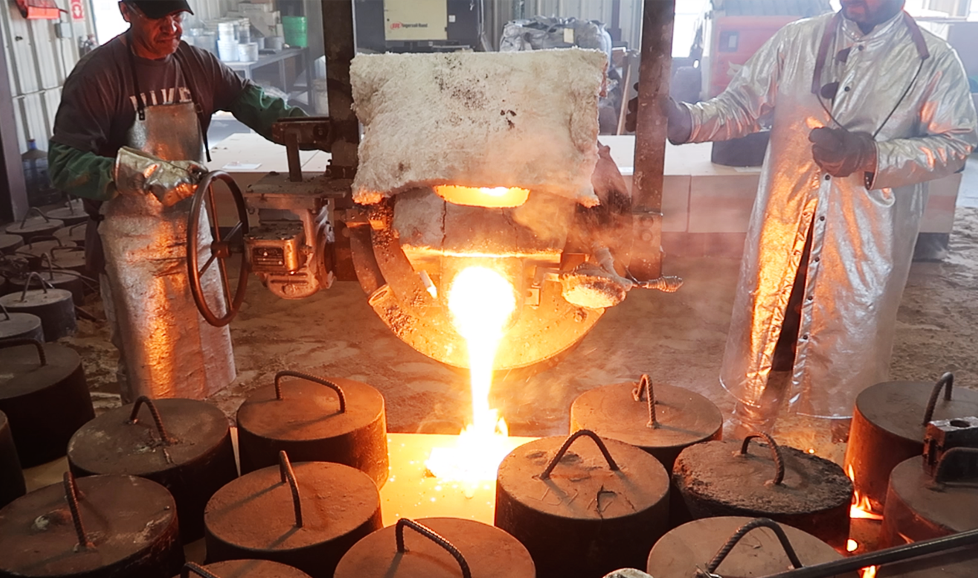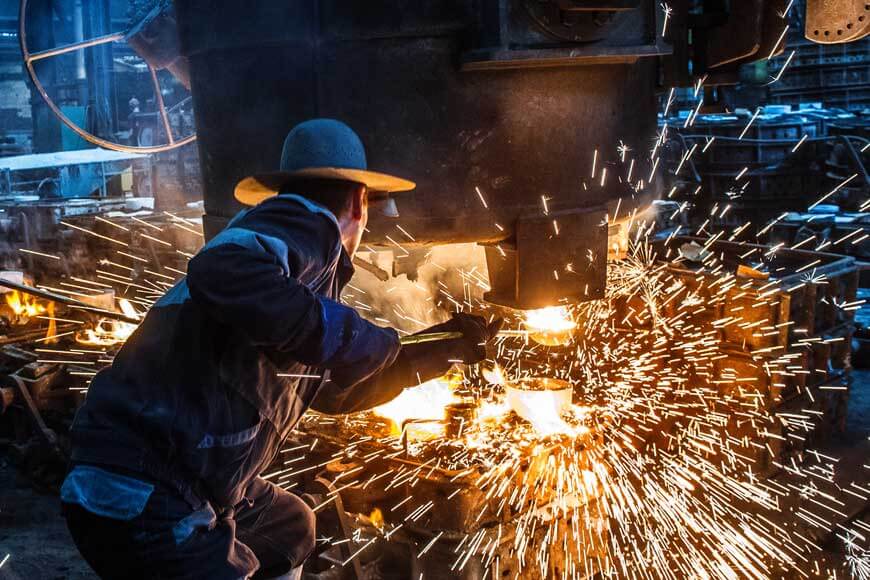A Comprehensive Overview to Metal Casting: Advantages and Providers Used by Foundries
Metal casting is a critical process in various markets, providing various benefits through the solutions of factories. These centers change liquified metal right into exact and sturdy elements, accommodating certain customer requirements. By utilizing advanced technologies, foundries assure quality and efficiency in manufacturing. The complexities of metal casting and the varied methods involved raise crucial concerns concerning its duty in modern manufacturing. What advancements lie ahead in this necessary field?
Recognizing the Metal Casting Process
The metal casting procedure is a basic strategy made use of in producing to create complicated forms and components. This method includes putting liquified metal into a mold and mildew made to form the preferred item. The process begins with pattern creation, which acts as a template for the mold and mildew. Metal Casting. Various materials, such as sand, metal, or ceramic, are used for mold-making, relying on the details demands of the casting
As soon as the mold and mildew is ready, molten metal is put into it and enabled to strengthen and cool down. After solidification, the mold and mildew is eliminated, exposing the cast component. Different techniques, including sand casting, financial investment casting, and die casting, are employed, each matched to various applications and materials. Quality control procedures, such as inspections and screening, are necessary to guarantee the last item fulfills requirements. Overall, the metal casting procedure plays a vital role in generating components for markets ranging from vehicle to aerospace.
Key Conveniences of Metal Casting
Metal casting supplies considerable benefits that make it a recommended manufacturing approach in various sectors. Its style versatility and precision permit complex shapes, while cost-efficient mass manufacturing improves effectiveness. Furthermore, the flexibility and stamina of materials used in casting add to the toughness of the last products.
Design Adaptability and Accuracy
Releasing impressive layout flexibility and accuracy, metal casting allows designers and designers to develop elaborate shapes and attributes that would certainly be challenging or impossible to achieve with other manufacturing methods. This capability allows the production of complicated geometries, interior structures, and great details that improve product capability and appearances. Furthermore, numerous casting techniques, such as sand casting, investment casting, and die casting, provide more alternatives for personalization, suiting diverse product buildings and task demands. The flexibility of molds allows adjustments during the layout phase, streamlining the change from concept to end product. Eventually, metal casting stands out for its capability to supply high-precision elements, making it an invaluable procedure in markets ranging from auto to aerospace and beyond.
Cost-Effective Automation
Economical automation stands as one of the key advantages of metal casting, enabling manufacturers to generate big amounts of components at a reduced cost per system. This efficiency occurs from the capacity to develop intricate molds that can be recycled numerous times, substantially minimizing configuration and operational costs. In addition, metal casting procedures, such as sand casting and pass away casting, permit high throughput, making it practical to fulfill the demands of massive production runs. The reduced product waste and energy usage further enhance cost financial savings, making metal casting an eye-catching alternative for markets needing mass components. On the whole, the cost-efficient nature of metal casting settings it as a recommended technique for manufacturers intending for economic effectiveness in their manufacturing processes.
Product Versatility and Stamina
Among the standout characteristics of metal casting is its remarkable material convenience, which enables the usage of a variety of alloys and steels. This versatility makes it possible for suppliers to choose products that best match their specific applications, from light weight aluminum and bronze to iron and steel. Each metal supplies special homes, consisting of differing degrees of strength, deterioration resistance, and thermal conductivity. As a result, metal casting can produce elements that satisfy stringent performance needs throughout diverse markets, such as auto, aerospace, and building. Furthermore, the toughness of cast steels can be boosted via various treatment processes, ensuring durability and long life. Aluminum Foundry. In general, the combination of product convenience and integral toughness makes metal casting a recommended selection for generating premium parts
Sorts Of Metal Casting Methods
Metal casting incorporates a selection of techniques that accommodate different manufacturing needs and material residential properties. Usual approaches consist of sand casting, which uses a sand mold for complicated forms, and investment casting, understood for its accuracy and surface coating. Pass away casting is one more method that utilizes high-pressure shot of liquified metal into molds, ideal for mass production of tiny components.
Covering molding uses a faster alternative, using a resin-coated sand to produce thin-walled molds, while shed foam casting permits complex styles without the requirement for a core.
Furthermore, continual casting is used for creating long areas of metal, such as bars or sheets, by strengthening liquified metal in a continuous procedure. Each technique is and presents distinct benefits selected based on elements like the called for information, manufacturing quantity, and product kind, guaranteeing superior results in metal construction throughout numerous sectors.
The Role of Foundries in Metal Casting
Foundries play a crucial duty in the metal casting procedure, working as the centers where liquified metal is changed right into finished items. These specialized establishments are equipped with the required devices and technologies to take care of different steels, guaranteeing high-quality end results. Foundries are in charge of a number of important functions, consisting of thawing the metal, putting it into molds, and enabling it to strengthen.
Furthermore, they keep stringent security and ecological criteria to shield workers and minimize environmental influence. Knowledgeable specialists and designers collaborate to maximize casting procedures, improving efficiency and lowering waste. Foundries likewise take part in quality assurance steps, making sure that the end products satisfy certain resistances and specifications. This quality control is essential for markets that count on accurate elements, such as automobile and aerospace. As an outcome, foundries contribute substantially to the overall manufacturing landscape, making it possible for development and growth throughout different markets.
Custom Metal Casting Solutions
Personalized metal casting services provide tailored style solutions that meet specific client needs. These solutions likewise supply product choice experience, making sure the best metal is selected for the preferred application. Such adaptability and understanding improve the total quality and efficiency of the final item.

Customized Style Solutions
Tailored layout remedies in metal casting give producers with the adaptability to produce elements that satisfy particular efficiency and aesthetic needs. Foundries supply customized solutions that enable customers to specify measurements, forms, and surface area finishes to accomplish wanted outcomes. This personalization process typically consists of collaboration between engineers and designers, guaranteeing that the final products line up with operational requirements and sector requirements. Advanced modern technologies, such as computer-aided style (CAD) and simulation software, allow accurate modeling and screening of parts prior to manufacturing, minimizing errors and enhancing performance. By leveraging customized layout options, services can optimize capability while decreasing waste and expenses, inevitably causing a more one-upmanship in the market. This adaptability is vital for industries calling for unique applications and requirements.
Product Selection Expertise
When choosing products for metal casting, know-how plays a vital role in guaranteeing that the appropriate option straightens with both efficiency requirements and cost-effectiveness. Factories utilize proficient professionals that understand the buildings of various metals and alloys, allowing them to advise perfect products for specific applications. Factors such as strength, deterioration resistance, and thermal conductivity are meticulously taken into consideration to satisfy the client's needs. In addition, sector trends and advancements in product scientific research inform check here these decisions, making it possible for factories to remain affordable. By leveraging their know-how, factories can assist clients in guiding through complex material options, eventually causing improved item high quality and minimized manufacturing costs. This specific expertise is vital for attaining successful outcomes in personalized metal casting solutions.
Quality Assurance in Metal Casting
Quality control in metal casting is important to guarantee that the end products fulfill the called for requirements and efficiency standards. Shops use a variety of techniques and techniques to guarantee the finest of cast elements. This procedure starts with rigid material inspections, validating that resources conform with industry standards. Throughout the casting procedure, real-time monitoring and testing are conducted to assess criteria such as temperature level, mold honesty, and dimensional precision.

Applications of Metal Castings Across Industries
Metal castings play a vital function in different sectors, working as the foundation for many applications. In the automobile field, cast elements such as engine blocks and transmission real estates are essential for car performance and dependability. The aerospace industry counts on accuracy spreadings for important elements that guarantee safety and security and efficiency in trip. Furthermore, the building and construction industry uses metal castings for fixtures, installations, and architectural elements, enhancing the resilience of structures and infrastructure.
The energy market advantages from castings utilized in wind turbine blades and various other equipment vital for power generation. The clinical area also makes use of metal castings in instruments and gadgets, demonstrating the flexibility of this manufacturing process. In general, metal castings are indispensable to the functionality and development of varied markets, showcasing their significance in modern-day technology and facilities development
Regularly Asked Inquiries
What Products Are Frequently Used in Metal Casting?
Usual materials utilized in metal casting consist of aluminum, iron, bronze, brass, and steel. Each product provides one-of-a-kind residential or commercial properties ideal for different applications, allowing producers to pick the most effective choice based on weight, toughness, and deterioration resistance.
The length of time Does the Metal Casting Process Normally Take?
The metal casting process normally takes a number of hours to a few days, depending upon aspects such as the complexity of the style, type of metal used, and the specific casting technique employed by the factory.
What Is the Environmental Effect of Metal Casting?
The ecological impact of metal casting consists of energy usage, exhausts, and waste generation. Factories commonly carry out steps to reduce these effects, such as recycling materials and making use of cleaner innovations to reduce their environmental impact.
Can Metal Casting Be Done for Small-Scale Projects?
Metal casting can certainly be executed for small-scale projects. Different foundries deal with such needs, supplying customized services that accommodate restricted production runs while keeping quality and accuracy in the end products.
What Are the Precaution in Metal Casting Foundries?
In metal casting factories, safety measures include individual protective devices, proper air flow, training on tools usage, emergency situation procedures, routine upkeep checks, and adherence to sector safety and security requirements to lessen dangers connected with molten metal and hazardous materials.
Additionally, metal casting processes, such as sand casting and die casting, permit for high throughput, making it viable to fulfill the needs of large production runs. One of the standout characteristics of metal casting is its exceptional material flexibility, which enables for the use of a large variety of metals and alloys. In addition, continual casting is made use of for creating lengthy areas of metal, such as sheets or bars, by solidifying liquified metal in a continual process. Foundries play an essential duty in the metal casting process, serving as the centers where liquified metal is transformed into ended up items. Usual products used in metal casting consist of light weight aluminum, iron, steel, brass, and bronze.